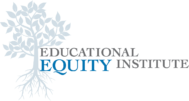Racial inequity in learning and educational achievement has long been present in the United States. Since our country’s inception, enslaved Africans were prohibited from learning how to read and write. Following the Civil War, there were advancements in educational equity when former slaves were instrumental in laying the foundation for a universal public education system.
However, these strides were short-lived. Jim Crow ushered in the era of “separate, but equal” where Black schools were woefully under-funded, and restrictions were put in place to limit the number of hours Black children could attend school. Brown vs. Board of Education provided the context for school integration; however, the ideals of the Brown ruling have yet to be fully realized. Hundreds of years of oppression and subjugation have resulted in pronounced disparities in academic achievement, suspensions and expulsions, and identification for special and gifted education.
The ongoing coronavirus has begun to cast a larger spotlight on the gross inequities within our nation’s schools. Children living in poverty, who are disproportionately Black, have less access to the internet, the technology needed to support learning from home, and high-quality instructional opportunities. According to a recent New York Times article, fewer than half of all low-income students are engaged in remote instruction during the COVID crisis. This is particularly concerning because, overwhelmingly, children living in poverty enter kindergarten already behind their more affluent peers.
Chronic absenteeism during the coronavirus increases the likelihood that many children will need to repeat a grade, or in the case of older students, drop out of school. The inequities that were present in our nation’s schools before this crisis have been exacerbated and will most likely increase the achievement gap for Black children living in poverty.
Although the coronavirus has created greater awareness about racial disparities within our nation’s schools, it is not enough to just know that this problem exists and has existed for generations.
We must ask ourselves, what are willing to do, what are we willing to sacrifice, so that all children within the United States have the same access to resources, supports, and high-quality learning opportunities? Are White families willing to lean in when school districts redraw boundaries between low and high poverty schools? Are White families willing to become vocal advocates for equity within the community, rather than proponents of inequity? Are system leaders ready to move beyond band-aid approaches where we implement literacy intervention after literacy intervention rather than changing policies and practices related to instruction, discipline, and identification for gifted and special education? Are system leaders willing to reallocate funds so that high-poverty schools have the resources and supports needed to address the needs of the children and families within their communities?
We must push ourselves out of our willful complacence so that we can challenge, disrupt, and replace. All of us, myself included, must engage in deep self-reflection about how we, personally, contribute to the ongoing inequities within the educational system. All of us play a role in disrupting the status quo of inequity. We are going to need to work together to create more just and equitable communities. What role are you willing to play?

